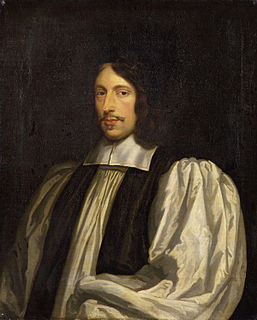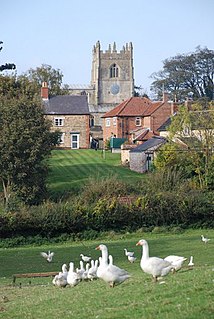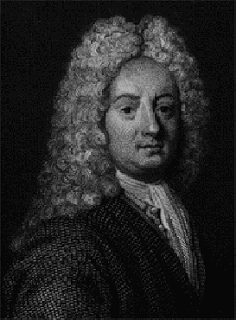
Wystan Hugh Auden was a British-American poet. Auden's poetry was noted for its stylistic and technical achievement, its engagement with politics, morals, love, and religion, and its variety in tone, form, and content. Some of his best known poems are about love, such as "Funeral Blues"; on political and social themes, such as "September 1, 1939" and "The Shield of Achilles"; on cultural and psychological themes, such as The Age of Anxiety; and on religious themes such as "For the Time Being" and "Horae Canonicae".

Bamburgh Castle is a castle on the northeast coast of England, by the village of Bamburgh in Northumberland. It is a Grade I listed building.

Nathaniel Crew, 3rd Baron Crew was Bishop of Oxford from 1671 to 1674, then Bishop of Durham from 1674 to 1721. As such he was one of the longest serving bishops of the Church of England.
Baybridge is a small village in Northumberland, England, just to the west of Blanchland and on the border with County Durham. It is situated to the west of Consett and the Derwent Reservoir, between Newbiggin and Blanchland. Baybridge is approximately 100 miles from Edinburgh, Scotland, and historically home to Northumbrian border pipers.

Blanchland is a village in Northumberland, England, on the County Durham boundary. The population of the Civil Parish at the 2011 census was 135.
"September 1, 1939" is a poem by W. H. Auden written on the outbreak of World War II. It was first published in The New Republic issue of 18 October 1939, and in book form in Auden's collection Another Time (1940).

Blanchland Abbey at Blanchland, in the English county of Northumberland, was founded as a premonstratensian priory in 1165 by Walter de Bolbec II, and was a daughter house of Croxton Abbey in Leicestershire. It became an abbey in the late 13th century. The 16th century former Abbot's house is a Grade II* listed building and the whole site is a Scheduled Ancient Monument.

Croxton Abbey, near Croxton Kerrial, Leicestershire, was a Premonstratensian monastery founded by William I, Count of Boulogne.

Thomas Forster, of Adderstone Hall, Northumberland, was an English landowner and Tory politician who sat in the House of Commons from 1708 to 1716. He served as a general of the Jacobite army in the 1715 Uprising and subsequently fled to France.
Sir Claudius Forster, 1st Baronet was a member of an ancient and influential Northumbrian family. He was descended from a long line of Governors of Bamburgh Castle, and was granted ownership of Bamburgh Castle and estates by the Crown in 1609.

Crewe Hall is a Jacobean mansion located near Crewe Green, east of Crewe, in Cheshire, England. Described by Nikolaus Pevsner as one of the two finest Jacobean houses in Cheshire, it is listed at grade I. Built in 1615–36 for Sir Randolph Crewe, it was one of the county's largest houses in the 17th century, and was said to have "brought London into Cheshire".

Sir George Crewe, 8th Baronet was an English Tory politician who represented the constituency of South Derbyshire.
The Oxford Magazine is a review magazine and newspaper published in Oxford, England.
Sir John Forster (c.1520–1602) was an English military commander and Warden of the Middle Marches.

The Beaufort Arms Hotel, Agincourt Square, Monmouth, Monmouthshire, south-east Wales is a former coaching inn dating from the early eighteenth century, though the frontage may have been modified by the prolific early Victorian architect George Vaughan Maddox in the 1830s. A stone cornice on the central block still carries the inscription "The Beaufort Arms". It is a Grade II* listed building as of 27 June 1952. It is one of 24 buildings on the Monmouth Heritage Trail.

Maenan Abbey was a monastic religious house located in Maenan, Conwy, Wales. It is situated near Llanrwst.

The Collegiate Church of St Bartholomew, Tong is a 15th-century church in the village of Tong, Shropshire, England, notable for its architecture and fittings, including its fan vaulting in a side chapel, rare in Shropshire, and its numerous tombs. It was built on the site of a former parish church and was constructed as a collegiate church and chantry on the initiative of Isabel Lingen, who acquired the advowson from Shrewsbury Abbey and additional endowments through royal support. Patronage remained with the lords of the manor of Tong, who resided at nearby Tong Castle, a short distance to the south-west, and the tombs and memorials mostly represent these families, particularly the Vernons of Haddon Hall, who held the lordship for more than a century. Later patrons, mostly of landed gentry origin, added further memorials, including the Stanley Monument which is inscribed with epitaphs specially written by William Shakespeare.

The Crewe Arms Hotel is a leisure facility in Nantwich Road, Crewe, Cheshire. It was for nearly 70 years the meeting place of Cheshire County Council.














